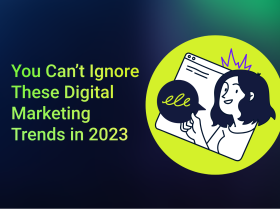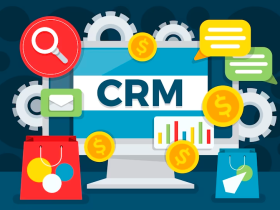If you’ve been in the world of ecommerce for a while, there’s a high chance you understand that customer retention costs less than customer acquisition — and can lead to increased profitability, revenue, and customer loyalty.
However, Ecommerce businesses face unique challenges in retaining customers, such as stiff competition, high customer expectations, and the lack of face-to-face interaction. To overcome these challenges and improve customer retention rates, Ecommerce businesses are increasingly turning to CRM Software, studies show.
CRM Software or Customer Relationship Management Software is a powerful technology that helps businesses manage customer relationships and interactions. It allows businesses to store and manage customer information, track customer behavior, and enhance the overall customer experience.
Kind of like a 360 degree view.
In this comprehensive article, we’ll delve into the world of CRM software, exploring its immense potential for Ecommerce businesses, including how it can help overcome common challenges and significantly improve customer retention rates.
Let’s get into it, shall we?
What is CRM Software?
At its core, CRM Software is a tool that helps businesses manage customer relationships and interactions. It provides businesses with a centralized platform to store and manage customer information, such as contact details, purchase history, and customer behavior. Using this information, businesses can gain insights into their customers’ needs, preferences, and behavior, enabling them to create personalized experiences and build lasting relationships.
There are several types of CRM Software, each with its own unique set of features and functionalities. Here are some of the most common types of CRM Software:
Operational CRM: This type of CRM Software focuses on streamlining and automating customer-facing processes, such as sales, marketing, and customer service.
Analytical CRM: Analytical CRM Software helps businesses analyze customer data to gain insights into customer behavior, preferences, and needs. This information can be used to create targeted marketing campaigns, personalize customer experiences, and improve overall customer satisfaction.
Collaborative CRM: Collaborative CRM Software is designed to facilitate communication and collaboration between different teams within a business, such as sales, marketing, and customer service. By sharing customer data and insights, businesses can ensure that all teams are aligned and working towards the same goal of improving customer retention.
In short, just know that CRM Software is a powerful tool that can help Ecommerce businesses improve customer retention rates by providing personalized experiences, streamlining processes, and creating targeted marketing campaigns.
Importance of Customer Retention for Ecommerce Businesses
Now that we understand what CRM Software is and how it can benefit Ecommerce businesses, let’s delve into the importance of customer retention for these businesses.
“Ecommerce businesses face stiff competition from both established players and new entrants, making it essential for them to retain existing customers to ensure long-term profitability and growth. That’s why leaning on a CRM Software can provide a way to find hidden gaps and new opportunities to sneak your way up”, says Jake Smith, Founder of Personalised Number Plates.
Here are some of the reasons why customer retention is critical for Ecommerce businesses:
Cost-effective: Retaining existing customers is more cost-effective than acquiring new ones. According to studies, acquiring a new customer can cost up to five times more than retaining an existing one.
Repeat business: Existing customers are more likely to make repeat purchases than new customers. By providing a positive customer experience and building long-term relationships, Ecommerce businesses can ensure repeat business from their existing customer base.
Positive word-of-mouth: Satisfied customers are more likely to recommend a business to their friends and family, leading to positive word-of-mouth marketing and increased brand awareness.
Increased customer lifetime value: Customer lifetime value refers to the amount of revenue a customer generates for a business over their lifetime. By retaining existing customers and increasing their lifetime value, Ecommerce businesses can increase their overall revenue and profitability.
To achieve all of that, you need to invest in tools and strategies that enable you to provide personalized experiences and build lasting relationships with their customers.
And that is where CRM Software comes in:
How CRM Software can Improve Customer Retention for Ecommerce Businesses?
Let’s talk about some of the ways a CRM Software helps businesses like you retain customers.
-
Personalized communication with customers
One of the significant challenges Ecommerce businesses face is providing personalized communication with customers.
Jamie Irwin, Marketing Executive at Service Club, says, “With the lack of face-to-face interaction, it can be challenging to understand customers’ needs and preferences and provide them with a tailored experience. However, CRM Software can help overcome this challenge by enabling you to collect and analyze customer data to provide personalized communication.”
Here’s how CRM Software can help Ecommerce businesses provide personalized communication with customers:
Customer data collection: CRM Software allows businesses to collect customer data such as purchase history, browsing behavior, and demographics, which can be used to understand customer preferences and needs.
Segmentation: By segmenting customers based on their characteristics and behavior, businesses can provide personalized communication with customers that are relevant to their interests and needs.
Automation: With CRM Software, businesses can automate personalized communication with customers through emails, text messages, and other channels. For example, businesses can send personalized product recommendations to customers based on their purchase history or abandoned cart reminders.
Feedback collection: CRM Software enables businesses to collect feedback from customers and use it to improve their products and services continually.
By utilizing a survey maker to provide personalized communication with customers, you can improve customer satisfaction, increase customer loyalty, and ultimately improve their overall retention rates.
For example, a study by Epsilon found that personalized emails have an open rate 29% higher than non-personalized emails, highlighting the importance of personalized communication in improving customer engagement and retention.
-
Tracking Customer Behavior
Tracking customer behavior is another critical aspect of improving customer retention for Ecommerce businesses. As Jeoffrey Murray, Digital Marketing Expert at Solar Panel Installation, shares, “Businesses can take advantage of sophisticated analytics tools that allow them to track customer behavior and make data-driven decisions. With these insights, businesses can better understand their customers’ needs, preferences, and pain points, and use this information to optimize their marketing, sales, and customer service strategies.”
Here’s how CRM Software can help Ecommerce businesses track customer behavior:
Purchase history: CRM Software allows businesses to track customer purchase history, including the products they’ve bought, the frequency of purchases, and the average purchase value. This information can help businesses identify popular products and categories and develop targeted marketing campaigns and promotions.
Browsing behavior: By tracking customer browsing behavior, businesses can gain insights into customer interests and preferences. For example, if a customer spends a lot of time browsing a particular product category, businesses can assume that they’re interested in that category and develop marketing campaigns and promotions to target them.
Feedback collection: CRM Software enables businesses to collect feedback from customers, which can provide valuable insights into their behavior and preferences. By analyzing feedback, businesses can identify areas for improvement in their products, services, and overall customer experience.
Social media monitoring: CRM Software can also be used to monitor customer behavior on social media. By tracking social media mentions and engagement, businesses can gain insights into customer sentiment, identify potential issues, and respond promptly to customer inquiries and complaints.
For example, by analyzing customer feedback, you can identify areas for improvement in your products and services and make necessary changes to address customer concerns.
-
Improved Customer Service
Another way CRM Software can improve customer retention for Ecommerce businesses is by improving customer service. “With such software, businesses can more easily track and resolve customer issues, manage customer inquiries and complaints, and provide personalized support — which can lead to increased customer satisfaction and retention”, says Jonathan Faccone, Managing Member & Founder of Halo Homebuyers.
Here’s how CRM Software can help Ecommerce businesses improve customer service:
Centralized Customer Information: With CRM Software, businesses can store all customer information in a centralized location, making it easier for customer support representatives to access and manage customer data. This can help customer support representatives provide faster and more personalized service to customers.
Automated Responses: CRM Software can be used to automate responses to customer inquiries and complaints, reducing the response time and improving overall customer satisfaction.
Real-time Data: CRM Software can provide real-time data on customer interactions, enabling businesses to track customer issues and resolve them promptly. This can help businesses improve customer satisfaction and retention.
For example, if a customer contacts customer support with a complaint about a product, the customer support representative can quickly access the customer’s purchase history and browsing behavior to understand their preferences and address their concerns promptly. This personalized approach can lead to increased customer satisfaction and retention.
-
Targeted Marketing
Another way CRM Software can improve customer retention for Ecommerce businesses is by enabling targeted marketing.
Freddie Smith, CEO of Sporting Post, says, “By using CRM Software to track customer behavior and preferences, you can create personalized marketing campaigns that resonate with your customers and increase the likelihood of repeat purchases.”
Here’s how CRM Software can help Ecommerce businesses with targeted marketing:
Personalized Messaging: CRM Software can be used to create personalized messaging that speaks directly to the customer’s needs and interests. By using customer data to tailor marketing messages, businesses can increase the effectiveness of their marketing campaigns and improve customer retention.
Automated Campaigns: CRM Software can be used to automate marketing campaigns, making it easier for businesses to target their customers with relevant messaging at the right time. This can help businesses improve the effectiveness of their marketing campaigns and increase customer loyalty and retention.
Cross-Selling and Upselling: CRM software, specifically Sales CRM Software, can be used to identify opportunities for cross-selling and upselling, enabling businesses to increase the value of each customer transaction. With Sales CRM Software, businesses can track customer purchasing patterns and preferences to suggest relevant accessories or upgrades that would enhance their experience with the laptop.
Also, businesses can create targeted social media campaigns that are customized to specific customer segments based on their demographics, interests, and previous purchase history. “The level of personalization you can achieve with CRM is so powerful. You finally get to understand and reach exactly your customers. It’s almost like, once you go CRM, there’s no coming back”, says Gerrid Smith, Chief Marketing Officer, Joy Organics.
For example, a fashion retailer can use CRM Software to identify customers who have purchased dresses and send them targeted marketing messages about new dress arrivals or accessories that would complement their dress purchase. By using customer data to tailor marketing campaigns, the retailer can increase the effectiveness of their messaging and improve customer retention.
-
Effective Use of Customer Data
In addition to personalized communication, tracking customer behavior, improved customer service, and targeted marketing, CRM software can also facilitate the effective use of customer data to improve customer retention for ecommerce businesses.
Dan Close, founder and CEO, Buy Houses in Kentucky, shares, “Data is the lifeblood of ecommerce businesses, but the key to success lies not just in collecting it, but in effectively leveraging it to drive growth. CRM software provides a powerful platform for ecommerce businesses to harness the full potential of their data, enabling them to identify trends, patterns, and insights that would otherwise remain hidden.”
Here are some ways in which CRM software can help ecommerce businesses effectively use customer data:
Centralized Customer Data: CRM software allows ecommerce businesses to store all customer data in one central location, making it easier to access and analyze. This allows businesses to gain a better understanding of their customers’ behavior, preferences, and needs, which can be used to tailor marketing efforts and improve the customer experience.
Automated Data Analysis: With CRM software, data analysis can be automated, allowing businesses to quickly identify patterns and trends in customer behavior. This can help businesses to identify opportunities for improvement, such as areas where customers are experiencing issues or where there is a high level of customer churn.
Predictive Analytics: Some CRM software includes predictive analytics capabilities, which can be used to forecast future customer behavior based on past data. This can help businesses to anticipate customer needs and proactively address any issues or concerns, improving the likelihood of customer retention.
Overall, effective use of customer data is a key factor in improving customer retention for ecommerce businesses, and CRM software can be a valuable tool in this regard.
Implementing CRM Software in Ecommerce Businesses
Now that we have discussed the importance of CRM software in improving customer retention for ecommerce businesses, it’s time to talk about how to implement it effectively. Here are some steps to follow:
Identify the right CRM software: There are many CRM software options available in the market. Choose the one that suits your business needs and budget. For example, Salesforce, HubSpot CRM, Zoho CRM, Microsoft Dynamics 365, and Insightly.
Train your team: It’s essential to train your team on how to use the CRM software. Make sure everyone understands the software’s features and how to use them to serve customers better.
Set goals and KPIs: Set specific goals and KPIs for your customer retention strategy. This will help you track progress and make necessary adjustments along the way.
Customize the software: Customize the software to fit your business needs. You may need to add some features or integrations to make it work better for your business.
Integrate with other systems: CRM software can integrate with other systems, such as your eCommerce platform, email marketing software, or social media platforms. This will enable you to have a more complete view of your customers and their behavior.
Test and optimize: Once you have implemented CRM software, test and optimize it continuously. Analyze the data, identify what’s working and what’s not, and make necessary adjustments to improve results.
Best Practices for using CRM Software for Customer Retention
Before you leave, take a look at some best practices for using it effectively:
Segment customers: Segmentation is one of the most critical aspects of effective customer retention. When you segment your customers, you group them into smaller, more specific groups based on their demographics, behavior, preferences, and interests. By doing so, you can create more personalized communication and targeted marketing campaigns that resonate with your customers’ needs and preferences. To segment your customers effectively, you can use data such as purchase history, frequency of visits, geographic location, and more.
Keep your data clean and updated: To use CRM software effectively, you need to ensure that the data you collect is accurate, up-to-date, and relevant. Clean data is essential for accurate customer segmentation, personalized communication, and effective marketing campaigns. Make sure to remove duplicate entries, correct any errors, and update any outdated information regularly. This will help you ensure that your CRM data is always reliable and useful.
Use automation wisely: CRM software allows you to automate various processes, including email marketing campaigns, social media posts, building authority backlinks and customer service inquiries. While automation can save time and improve efficiency, it’s essential to use it wisely. Automating too many processes can lead to impersonal communication and a lack of human touch. Therefore, it’s crucial to balance automation with personalization to ensure that your customers feel valued and heard.
Provide excellent customer service: Good customer service is crucial for customer retention. When your customers feel valued and heard, they’re more likely to remain loyal to your business. CRM software can help you provide excellent customer service by tracking customer interactions, providing customer feedback, and resolving issues quickly and efficiently. Train your customer service representatives to use CRM software effectively, so they can provide personalized and empathetic support to your customers.
Monitor customer behavior: Tracking customer behavior is critical for understanding their needs, preferences, and pain points. CRM software can help you monitor customer behavior by tracking their interactions with your website, social media platforms, and other digital touchpoints. By analyzing this data, you can gain insights into how your customers engage with your brand, what motivates them to make a purchase, and what barriers prevent them from doing so.
Create personalized communication: Personalized communication is critical for customer retention. It shows your customers that you understand their needs and preferences and care about their satisfaction. CRM software can help you create personalized communication by allowing you to segment your customers, track their behavior, and customize your marketing messages accordingly. Use CRM software to send personalized emails, social media messages, and other communications that resonate with your customers’ needs and preferences.
Conclusion
Customer retention is critical for the success of any ecommerce business. It is not enough to acquire new customers; keeping them loyal and engaged is equally important. This is where CRM software comes in – it helps businesses manage and analyze customer data to deliver personalized experiences, track behavior, and offer effective customer service.
CRM software allows ecommerce businesses to create targeted marketing campaigns that resonate with their audience and encourage repeat purchases. With the ability to track customer behavior, businesses can understand what works and what doesn’t, and adjust their strategies accordingly.
Investing in CRM software is a smart move for any ecommerce business looking to improve customer retention. While it may require some time and effort to implement, the benefits far outweigh the costs. With the right CRM software, businesses can build strong relationships with their customers and set themselves up for long-term success.
Good luck!











Leave a Reply